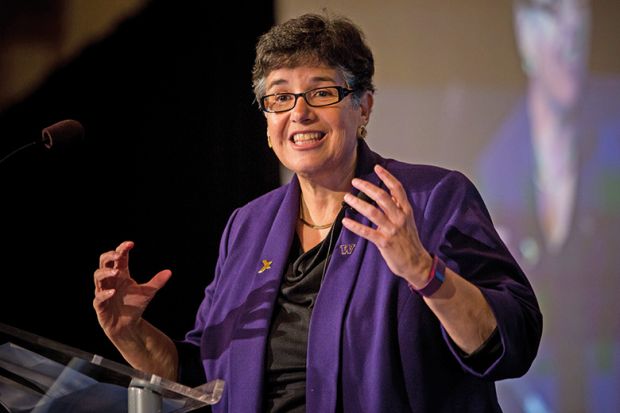Ana Mari Cauce has not shied away from criticism of the current political climate in the US.
For example, in an article for The Seattle Times last August, the University of Washington president spoke out “in opposition to white nationalists, Nazis and the Ku Klux Klan” after the far-right rally in Charlottesville, Virginia.
So it is perhaps surprising that when it comes to her views on the future of higher education in a US led by Donald Trump, she is optimistic.
“First of all I think that it’s important to keep in mind that some of the biggest threats that we felt for a while seemed to be there, things like [loss of] funding, did not pan out,” Professor Cauce explained to Times Higher Education.
“The NSF [National Science Foundation] and NIH [National Institutes of Health] did keep the bulk of their funding. At some point there were really a lot of fears. I’m not saying that those fears were entirely allayed but that [the funding cut] didn’t happen.”
Her relatively sunny outlook could be related to the fact that she feels that universities in the US, including Washington, have to a certain extent safeguarded themselves against any potential shocks from the government through their many partnerships with other academic institutions, industry and local government.
“Part of why [the funding cuts] didn’t happen, and that is the importance of partnerships, is that when it came right down to it, I think that most [members of] Congress realised what it is that their universities – their research public universities in particular – are doing for their communities. And so it was incredibly unpopular to do this,” Professor Cauce said.
“In many ways, I think that our biggest defence to whatever comes our way, whether it might be an administration that’s less friendly to research or budget shortfalls...is by having good partners that will come to bat for us [and] that can testify as to why we’re important.”
While such collaboration is not new, the university has been thinking about its approaches to partnerships “in a much more mindful way” in recent years.
Search our database for the latest university jobs in North America
“The fact that we had started very consciously involving ourselves in these partnerships put us in a good position coming forward in the sense that it makes us less solely dependent on the federal government,” Professor Cauce said.
Washington’s collaborations are heavily focused on the institution’s goal to be “the best public university in the world in terms of impact”, specifically the added value to students and the local community, she said.
For example, the university’s Institute for Learning and Brain Sciences’ involvement with the local government has resulted in increased support for early childhood education programmes, while its computer science department has worked with industry to create funding opportunities to meet labour demands.
“One of the ironies is that at the same time as probably higher education is more important to the world than ever before, just because of the nature of the discoveries that are coming out…there are some sectors of the public that are wondering about the value of higher education. And I think that it would be certainly silly, and at the worst harmful, if we ignored that,” she said.
Professor Cauce, who is also a professor of psychology and American ethnic studies at Washington, added that one of the major developments of the higher education sector in recent years has been its move away from being very “inward-looking”.
“There are universities that were built in rural areas with the precise notion that to think great thoughts you had to be away from the hurly-burly of life,” she said. “And I think the academy has changed tremendously in its involvement in civic life in a very concerted sort of way, in a very mindful sort of way, rather than just by happenstance.”
ellie.bothwell@timeshighereducation.com
Ana Mari Cauce will deliver a keynote speech on the power of partnership and what global research universities bring to the innovation economy at the Times Higher Education Asia Universities Summit. The event will take place from 5 to 7 February in Shenzhen, China, in partnership with the Southern University of Science and Technology.





